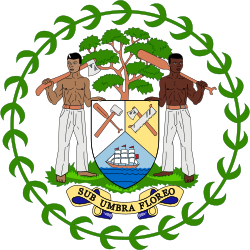Background
The PUP went into the election with a 13–5 majority, having picked up a seat after the previous election when Toledo District Area Rep. Vicente Choco crossed the floor from the opposition United Democratic Party in 1975. [3] The election results confirmed that 13-5 majority.
In 1979, Belizeans were concerned about their progress toward independence and the Guatemalan claim to the colony. The UDP were not in favour of advancing on the former issue without a substantial settlement of the latter, and this led the PUP to turn the election into a sort of referendum on that question. By their turnout (a record high) and their support for the PUP, Belizeans made clear their preferences and set in motion the chain of events that would lead to independence in 1981.
This page is based on this
Wikipedia article Text is available under the
CC BY-SA 4.0 license; additional terms may apply.
Images, videos and audio are available under their respective licenses.


